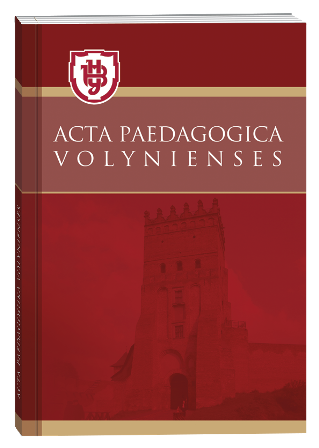PLANE OF SOCIAL READINESS FOR LEARNING IN SCHOOL OF CHILDREN OF SENIOR PRESCHOOL AGE
DOI:
https://doi.org/10.32782/apv/2021.4.21Keywords:
community, society, social, social readiness for school, children of older preschool ageAbstract
In the scientific research a theoretical analysis of the problem of studying social readiness for the school of older children. The purpose of the study is to conduct a theoretical review of scientific sources devoted to social readiness for the schooling of older preschool children. Research methods: analysis of scientific sources. Objectives of the study: theoretical analysis of scientific sources, both classical and modern research on the problem of studying social readiness for the schooling of older preschool children; substantiation of terms such as “society”, “society”, “social” and terms – “social readiness for school”; the determination of the main indicators of social readiness in older preschool children; disclosure of the influence of the team on the social development of the older preschooler; a study of the measurement of readiness for school, which are presented in foreign research; an indication of the role of parental upbringing in the formation of social readiness for schooling. Realistic scientific and theoretical research has shown that the process of socialization is of great importance for the development of the child’s personality. Social experience, traditions, cultural heritage, certain rules and norms of behavior form a special attitude of the preschooler to the world around it; the content of terms and terms is studied; it was revealed that indicators of social readiness for school in older preschool children are primarily the formation of motivation to learn, the ability to acquire new knowledge, the desire to learn, being able to feel comfortable in a new learning environment, being able to listen to teachers, performing their tasks, cooperating with students in class, bringing their actions to a logical conclusion; it is determined that the preschooler acquires social experience in a group of peers, during joint activities are formed: individual traits, self-esteem, self-confidence, self-presentation, attitude to itself, especially those qualities that are necessary during schooling; there were identified six dimensions of readiness for school, including social and emotional maturity; it is proved that the child acquires social experience during interaction and communication with the close environment. Parental support, proper education and upbringing help the child to go through the stage of socialization. In the future, the prospect of our study is the study of social readiness for school in children with speech pathology.
References
Артемова Л. Формирование социальной активности. Дошкольное воспитание. 1999. № 4. С. 39–41.
Белова Е. Влияние внутрисемейных отношений на развитие одаренности в дошкольном возрасте. Психолог в детском саду. 2008. № 1. С. 27–32.
Бєлова О.Б. Особливості прояву емоційних переживань у молодших школярів з порушеннями мовлення. Актуальні питання корекційної освіти (педагогічні науки). 2020. Вип. 15. С. 5–14.
Вьюнова Н.И., Гайдар К.М. Проблемы психологической готовности детей 6–7 лет к школьному обучению. Психолог в детском саду. 2005. № 2. С. 13–19.
Римашевская Л. Социально-личностное развитие. Дошкольное воспитание, 2007. № 6. С. 18–20.
Слабко Л.С. Социальная готовность ребенка к школе. European science, 2019. № 9 (19). С. 28–31.
Хапачева С.М., Дзеверук В.С. Социально-психологическая готовность детей к школе как значимый компонент общепсихологической готовности ребенка к школьному обучению. Концепт. 2014. № 12. С. 1–7. URL: http://e-kon-cept.ru/2014/14351.htm.
Bielova O. Patterning types of aggressive behaviour of primary school children with speech disorders. Special education. Vol 2. № 40. 2019. Р. 201–236.
Bronfenbrenner U.A. Dotaznik rodicovskych vztahu. Bratislava, 1969. 271 p.
Bruner J.S. Beyond the information given: Studies in the psychology of knowing. L., 1970. 216 p.
Fayez M., Ahmad J.F., & Oliemat E. Jordanian Kindergarten and 1st-Grade Teachers’ Beliefs about Child-Based Dimensions of School Readiness. Journal of Research in Childhood Education. 2016. № 30 (3). Р. 293–305.
Jose K., Banks S., Hansen E., Jones R., Zubrick S., Staford J., Taylor C. Parental Perspectives on Children’s School Readiness: An Ethnographic Study. Early Childhood Education Journal. 2020. https://doi.org/10.1007/s10643-020-01130-9
Ladd G.W., Herald S.L., & Kochel K.P. School readiness: Are there social prerequisites? Early Education and Development. 2006. № 17 (1). Р. 115–150.
Mashburn A.J., & Pianta R.C. Social relationships and school readiness. Early Education and Development. 2006. № 17 (1). Р. 151–176.
Pan Q., Trang, K.T., Love H.R., & Templin J. Scholl Readiness Profiles And Growth In Academic Achivement. Frontiers in Education. 2019. № 4. Р. 1–17
Pekdoğan, Serpil & Akgül, Esra. Preschool Children’s School Readiness. International Education Studies, 2016. 10. 144. 10.5539/ies.v10n1p144.
Sheridan S., Knoche L., Edwards C., Bovaird J., Kupzyk K. Parent Engagement and School Readiness: Effects of the Getting Ready Intervention on Preschool Children’s Social–Emotional Competencies. Early Educ Dev. 2010. Jan 1. № 21 (1). Р. 125–156.
Zazzo R. Manuel pour lexamen psychologique de lenfant. Neuchatel, 1960. 304 р.







